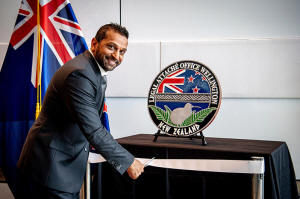FBI boss Kash Patel gave New Zealand officials 3D-printed guns illegal
to possess under local laws
[September 30, 2025]
By CHARLOTTE GRAHAM-McLAY and JIM MUSTIAN
WELLINGTON, New Zealand (AP) — On a visit to New Zealand, FBI Director
Kash Patel gave the country’s police and spy bosses gifts of inoperable
pistols that were illegal to possess under local gun laws and had to be
destroyed, New Zealand law enforcement agencies told The Associated
Press.
The plastic 3D-printed replica pistols formed part of display stands
Patel presented to at least three senior New Zealand security officials
in July. Patel, the most senior Trump administration official to visit
the country so far, was in Wellington to open the FBI’s first standalone
office in New Zealand.
Pistols are tightly restricted weapons under New Zealand law and
possessing one requires an additional permit beyond a regular gun
license. Law enforcement agencies didn’t specify whether the officials
who met with Patel held such permits, but they couldn’t have legally
kept the gifts if they didn’t.
It wasn't clear what permissions Patel had sought to bring the weapons
into the country. A spokesperson for Patel told the AP Tuesday that the
FBI would not comment.
The pistols were surrendered and destroyed
Inoperable weapons are treated as though they’re operable in New Zealand
if modifications could make them workable again. The pistols were judged
by gun regulators to be potentially operable and were destroyed, New
Zealand’s Police Commissioner Richard Chambers told AP in a statement
Tuesday.
Chambers didn’t specify how the weapons had been rendered inoperable
before Patel gifted them. Usually this means the temporary disabling of
the gun’s firing mechanism.

Three of New Zealand’s most powerful law enforcement figures said they
received the gifts at meetings July 31. Chambers was one recipient, and
the other two were Andrew Hampton, Director-General of the country’s
human intelligence agency NZSIS, and Andrew Clark, Director-General of
the technical intelligence agency GCSB, according to a joint statement
from their departments.
A spokesperson for the spy agencies described the gift as “a challenge
coin display stand” that included the 3D-printed inoperable weapon “as
part of the design.” The officials sought advice on the gifts the next
day from the regulator that enforces New Zealand’s gun laws, Chambers
said.
When the weapons were examined, it was discovered they were potentially
operable.

“To ensure compliance with firearms laws, I instructed Police to retain
and destroy them,” Chambers said.
James Davidson, a former FBI agent who is now president of the FBI
Integrity Project, a nonprofit that seeks to safeguard the bureau from
undue partisan influence, has criticized Patel's appointment.
But Davidson said the gift of the replica pistols appeared “a genuine
gesture” from Patel and their destruction was “quite frankly, an
overreaction by the NZSIS, which could have simply rendered the replica
inoperable,” he said.
[to top of second column]
|

In this photo released by the US Embassy in Wellington, New Zealand,
FBI Director Kash Patel cuts the ribbon at the official opening of
the FBI office in Wellington, New Zealand, July 31, 2025. (Ola
Thorsen/US Embassy via AP, File)

New Zealand has strong gun controls
3D-printed weapons are treated the same as other guns in New
Zealand. The country bolstered its gun restrictions following a 2019
white supremacist attack on two mosques in the city of Christchurch,
when 51 Muslim worshipers were shot dead by an Australian man who
had amassed a cache of semiautomatic weapons legally.
The guns Patel gifted to the law enforcement chiefs were not
semiautomatic models now prohibited after the Christchurch massacre.
But there are a suite of other reasons New Zealanders might not
legally be able to possess certain weapons, including the specific
permits required for pistols.
New Zealand doesn’t have a passionate culture of gun ownership and
the weapons have been viewed more dimly since the mass shooting. Gun
ownership is enshrined in New Zealand law as a privilege, not a
right.
The country isn’t short on guns; they’re common in rural areas for
pest control. But violent gun crime is rare and many urban residents
might never have even seen a firearm in person.
It’s uncommon even to see police officers carrying weapons.
Front-line officers aren’t usually armed on patrol and leave their
weapons locked in their vehicles.
Patel caused discomfort with China remarks
News of Patel’s visit caused ripples in New Zealand at the time
because the opening of the new FBI field office in Wellington wasn’t
divulged to news outlets or the public until it had already
happened. An FBI statement in July said the move aligned New Zealand
with FBI missions in other Five Eyes intelligence-sharing nations,
which also include the United States, Australia, Canada and the
United Kingdom.
The office would provide a local mission for FBI staff who have
operated with oversight from Canberra, Australia, since 2017, the
statement said.
Public records disclosed to local news outlets this month revealed
that Patel met with and dined with a more than a dozen senior public
servants and elected officials, including Cabinet ministers, during
his visit. It wasn’t immediately clear Tuesday how many officials
received the pistols as gifts.
Patel had already provoked mild diplomatic discomfort in Wellington
by suggesting in remarks supplied to reporters that the new FBI
office aimed to counter China’s influence in the South Pacific
Ocean, where New Zealand is located. The comments prompted polite
dismissal from officials in Wellington, who said the bolstered FBI
presence was primarily to collaborate on child exploitation and drug
smuggling crimes. Beijing decried Patel’s remarks.
___
Mustian reported from New York. Associated Press reporter Eric
Tucker contributed from Washington.
All contents © copyright 2025 Associated Press. All rights reserved |